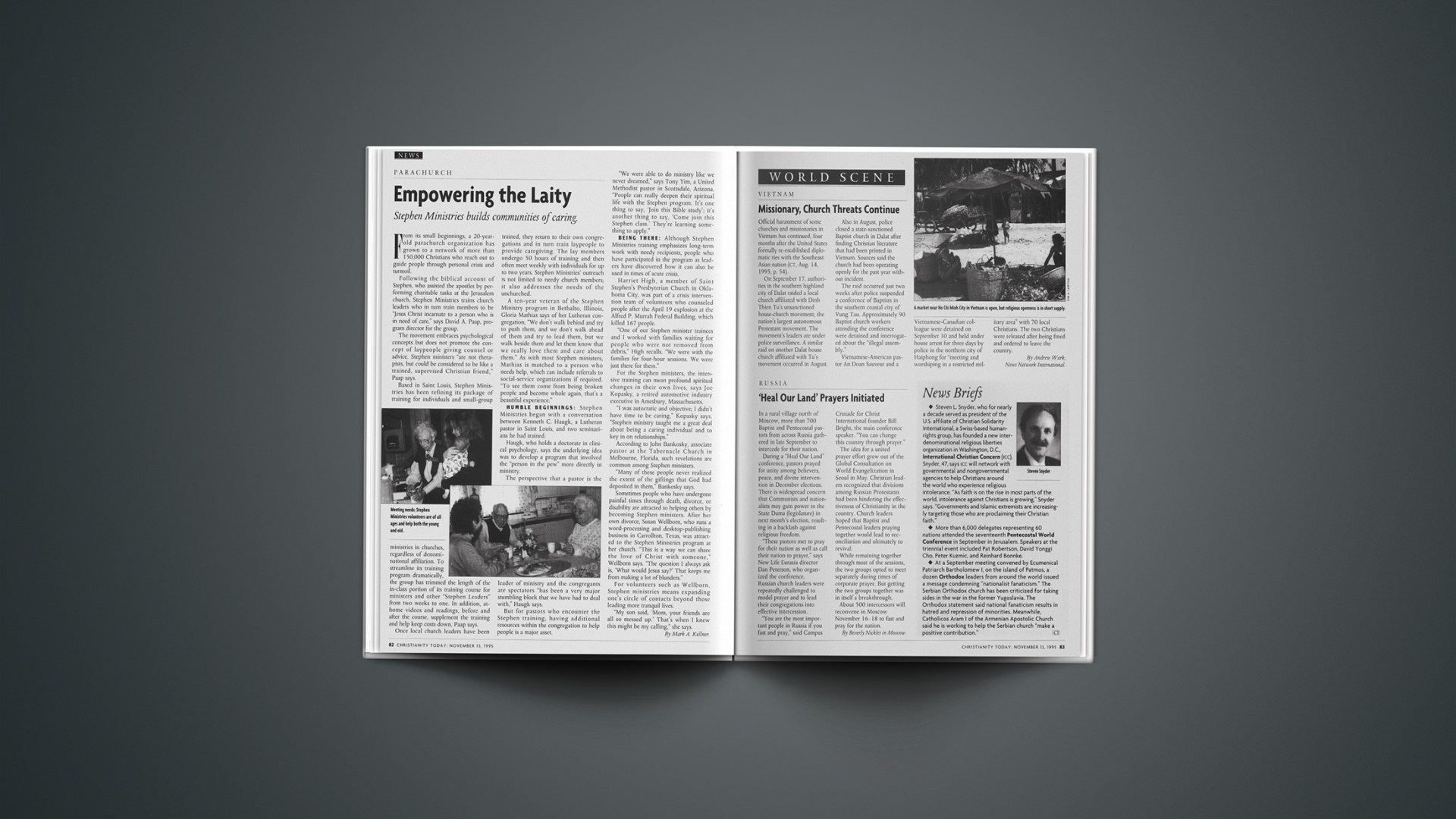From its small beginnings, a 20-year-old parachurch organization has grown to a network of more than 150,000 Christians who reach out to guide people through personal crisis and turmoil.
Following the biblical account of Stephen, who assisted the apostles by performing charitable tasks at the Jerusalem church, Stephen Ministries trains church leaders who in turn train members to be “Jesus Christ incarnate to a person who is in need of care,” says David A. Paap, program director for the group.
The movement embraces psychological concepts but does not promote the concept of laypeople giving counsel or advice. Stephen ministers “are not therapists, but could be considered to be like a trained, supervised Christian friend,” Paap says.
Based in Saint Louis, Stephen Ministries has been refining its package of training for individuals and small-group ministries in churches, regardless of denominational affiliation. To streamline its training program dramatically, the group has trimmed the length of the in-class portion of its training course for ministers and other “Stephen Leaders” from two weeks to one. In addition, at-home videos and readings, before and after the course, supplement the training and help keep costs down, Paap says.
Once local church leaders have been trained, they return to their own congregations and in turn train laypeople to provide caregiving. The lay members undergo 50 hours of training and then often meet weekly with individuals for up to two years. Stephen Ministries’ outreach is not limited to needy church members; it also addresses the needs of the unchurched.
A ten-year veteran of the Stephen Ministry program in Bethalto, Illinois, Gloria Mathias says of her Lutheran congregation, “We don’t walk behind and try to push them, and we don’t walk ahead of them and try to lead them, but we walk beside them and let them know that we really love them and care about them.” As with most Stephen ministers, Mathias is matched to a person who needs help, which can include referrals to social-service organizations if required. “To see them come from being broken people and become whole again, that’s a beautiful experience.”
Humble beginnings: Stephen Ministries began with a conversation between Kenneth C. Haugk, a Lutheran pastor in Saint Louis, and two seminarians he had trained.
Haugk, who holds a doctorate in clinical psychology, says the underlying idea was to develop a program that involved the “person in the pew” more directly in ministry.
The perspective that a pastor is the leader of ministry and the congregants are spectators “has been a very major stumbling block that we have had to deal with,” Haugk says.
But for pastors who encounter the Stephen training, having additional resources within the congregation to help people is a major asset.
“We were able to do ministry like we never dreamed,” says Tony Yim, a United Methodist pastor in Scottsdale, Arizona. “People can really deepen their spiritual life with the Stephen program. It’s one thing to say, ‘Join this Bible study’; it’s another thing to say, ‘Come join this Stephen class.’ They’re learning something to apply.”
BEING THERE: Although Stephen Ministries training emphasizes long-term work with needy recipients, people who have participated in the program as leaders have discovered how it can also be used in times of acute crisis.
Harriet High, a member of Saint Stephen’s Presbyterian Church in Oklahoma City, was part of a crisis intervention team of volunteers who counseled people after the April 19 explosion at the Alfred P. Murrah Federal Building, which killed 167 people.
“One of our Stephen minister trainees and I worked with families waiting for people who were not removed from debris,” High recalls. “We were with the families for four-hour sessions. We were just there for them.”
For the Stephen ministers, the intensive training can mean profound spiritual changes in their own lives, says Joe Kopasky, a retired automotive industry executive in Amesbury, Massachusetts.
“I was autocratic and objective; I didn’t have time to be caring,” Kopasky says. “Stephen ministry taught me a great deal about being a caring individual and to key in on relationships.”
According to John Bankosky, associate pastor at the Tabernacle Church in Melbourne, Florida, such revelations are common among Stephen ministers.
“Many of these people never realized the extent of the giftings that God had deposited in them,” Bankosky says.
Sometimes people who have undergone painful times through death, divorce, or disability are attracted to helping others by becoming Stephen ministers. After her own divorce, Susan Wellborn, who runs a word-processing and desktop-publishing business in Carrollton, Texas, was attracted to the Stephen Ministries program at her church. “This is a way we can share the love of Christ with someone,” Wellborn says. “The question I always ask is, ‘What would Jesus say?’ That keeps me from making a lot of blunders.”
For volunteers such as Wellborn, Stephen ministries means expanding one’s circle of contacts beyond those leading more tranquil lives.
“My son said, ‘Mom, your friends are all so messed up.’ That’s when I knew this might be my calling,” she says.
Copyright © 1995 Christianity Today. Click for reprint information.










